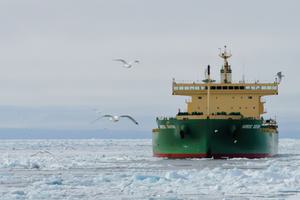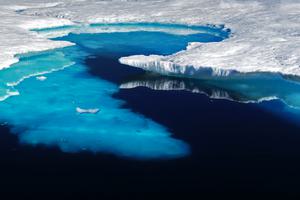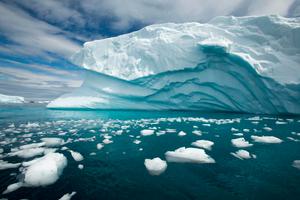Antarctica and the Arctic
-
Full Speed Ahead
Shipping Plans Grow as Arctic Ice Fades
-
What Would a Global Warming Increase of 1.5 Degrees Be Like?
The Paris climate conference set the ambitious goal of finding ways to limit global warming to 1.5 degrees Celsius, rather than the previous threshold of 2 degrees. But what would be the difference between a 1.5 and 2 degree world? And how realistic is such a target?
-
Why CO2 ‘Air Capture’ Could Be Key to Slowing Global Warming
Physicist Klaus Lackner has long advocated deploying devices that extract carbon dioxide from the atmosphere to combat climate change. Now, as emissions keep soaring, Lackner says in a Yale Environment 360 interview that such “air capture” approaches may be our last best hope.
-
After Paris, A Move to Rein In Emissions by Ships and Planes
As the world moves to slash CO2 emissions, the shipping and aviation sectors have managed to remain on the sidelines. But the pressure is now on these two major polluting industries to start controlling their emissions at last.
-
Climate Consequences
Abrupt Sea Level Rise Looms As Increasingly Realistic Threat
-
How Nations Are Chipping Away at Their Protected Lands
Winning protected status for key natural areas and habitat has long been seen as the gold standard of conservation. But these gains are increasingly being compromised as governments redraw park boundaries to accommodate mining, logging, and other development.
-
How Ocean Noise Pollution Wreaks Havoc on Marine Life
Marine scientist Christopher Clark has spent his career listening in on what he calls “the song of life” in the world’s oceans. In an interview with Yale Environment 360, he explains how these marine habitats are under assault from extreme—but preventable—noise pollution.
-
Is Climate Change Putting World’s Microbiomes at Risk?
Researchers are only beginning to understand the complexities of the microbes in the earth’s soil and the role they play in fostering healthy ecosystems. Now, climate change is threatening to disrupt these microbes and the key functions they provide.
-
Food Insecurity: Arctic Heat Is Threatening Indigenous Life
Subsistence hunters in the Arctic have long taken to the sea ice to hunt seals, whales, and polar bears. But now, as the ice disappears and soaring temperatures alter the life cycles and abundance of their prey, a growing number of indigenous communities are facing food shortages.
-
The Carbon Counters: Tracking Emissions in a Post-Paris World
In the wake of the Paris climate agreement, developing countries find themselves in need of analysts capable of monitoring their emissions. It’s a complex task, but organizations are stepping in with online courses to train these new green accountants.
-
The Haunting Legacy of South Africa’s Gold Mines
Thousands of abandoned gold mines are scattered across South Africa, polluting the water with toxics and filling the air with noxious dust. For the millions of people who live around these derelict sites, the health impacts can be severe.
-
The Rapid and Startling Decline Of World’s Vast Boreal Forests
Scientists are becoming increasingly concerned about the fate of the huge boreal forest that spans from Scandinavia to northern Canada. Unprecedented warming in the region is jeopardizing the future of a critical ecosystem that makes up nearly a third of the earth’s forest cover.
-
How China and U.S. Became Unlikely Partners on Climate
Amid tensions between the U.S. and China, one issue has emerged on which the two nations are finding common ground: climate change. Their recent commitments on controlling emissions have created momentum that could help international climate talks in Paris in December.
-
Northern Forests Emerge As the New Global Tinderbox
Rapidly rising temperatures, changes in precipitation, and increased lightning strikes are leading to ever-larger wildfires in the northern forests of Alaska, Canada, and Siberia, with potentially severe ecological consequences.
-
Oil Drilling in Arctic Ocean: A Push into Uncharted Waters
As the U.S. and Russia take the first steps to drill for oil and gas in the Arctic Ocean, experts say the harsh climate, icy seas, and lack of infrastructure means a sizeable oil spill would be very difficult to clean up and could cause extensive environmental damage.
-
How Long Can Oceans Continue To Absorb Earth’s Excess Heat?
The main reason soaring greenhouse gas emissions have not caused air temperatures to rise more rapidly is that oceans have soaked up much of the heat. But new evidence suggests the oceans’ heat-buffering ability may be weakening.






